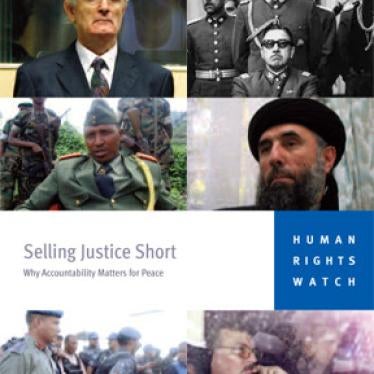(New York) - United Nations Security Council members should use the upcoming International Criminal Court (ICC) prosecutor's briefing on Darfur to send a strong message to Sudan to cooperate with the court or face council action, Human Rights Watch said today.
The ICC prosecutor will report on his Darfur investigation to the Security Council on June 11, 2010. On May 25, after three years of inaction by the Sudanese government on ICC arrest warrants, the court took an unprecedented decision to send a formal finding of non-cooperation to the council. Security Council Resolution 1593, which refers the situation in Darfur to the ICC, requires the government of Sudan to cooperate fully.
"Sudan has thumbed its nose at the Security Council's authority for too long," said Elise Keppler, international justice senior counsel at Human Rights Watch. "Council members should make it clear that Sudan cannot ignore its obligation to cooperate with the court."
In its Darfur investigation, the ICC has issued arrest warrants for three individuals for war crimes and crimes against humanity. In April 2007, the court issued warrants for Ahmed Haroun, then the country's minister for humanitarian affairs and now governor of Southern Kordofan state, and Ali Kosheib, whose real name is Ali Mohammed Ali, a "Janjaweed" militia leader. In March 2009, the court issued a warrant for Sudan's president, Omar al-Bashir.
Sudan refuses to hand over any of the suspects and on April 19, the prosecutor asked the ICC judges to issue a finding of non-cooperation in the execution of warrants for Haroun and Kosheib under article 87 of the ICC statute. On May 25, ICC Pre-Trial Chamber I decided to send the finding of non-cooperation on the warrants to the Security Council.
"The Security Council made the court's investigation of atrocities in Darfur possible," Keppler said. "Now it needs to work to ensure that suspects are brought to the dock to face trial."
The court's May 25 decision indicates that the finding will be forwarded "in order for the Security Council to take any action it may deem appropriate." This is the first time a finding of non-cooperation has been sent to the council, so next steps are not fully clear, although the council has a range of options, such as resolutions and sanctions.
Some council members appear to be resisting council response to the finding of non-cooperation over concerns that it could undermine implementation of Sudan's Comprehensive Peace Agreement that ended the country's north-south conflict. However, experience has shown that the feared consequences of promoting justice often do not materialize, Human Rights Watch said. Impunity for serious crimes moreover carries the risk of engendering further abuses, which has been underscored by the Sudanese government's use of the same scorched earth tactics in Darfur that it used in the south.
Human Rights Watch said Sudan's failure to cooperate should be discussed at a high-level meeting on Sudan that will take place at the Security Council on June 14. The meeting will include briefings by Haile Menkerios, the UN secretary-general's special representative for the UN mission in Sudan; Ibrahim Gambari, the joint special representative for the African Union-UN peacekeeping mission in Darfur; Djibril Bassolé, the AU-UN joint chief mediator for Darfur; and Thabo Mbeki, the former South African president, who heads the AU High Level Implementation Panel on Sudan.
"Without its own police force, the ICC relies on cooperation to execute warrants," Keppler said. "It is imperative for both the court's work and the Security Council's own credibility that the council acts strongly on the finding of non-cooperation."
Background
The prosecutor's briefing, his 11th, is part of bi-annual reporting to the Security Council on his work on Darfur under Resolution 1593, which referred the situation in Darfur to the ICC.
Article 87 of the ICC's Rome Statute permits the court to issue a finding of non-cooperation. Because Darfur is before the ICC as a result of a Security Council referral, such a finding is sent to the council for follow-up.
In addition to the warrants issued for Haroun, Kosheib, and al-Bashir, the prosecutor is pursuing cases against three Darfuri rebel leaders for attacks on an AU base in Haskanita in Darfur. One of the suspects is Bahar Idriss Abu Garda. The others have not been named publicly. The ICC judges declined to confirm charges against Abu Garda over lack of evidence in February, but the prosecutor has indicated his intention to submit further evidence.







